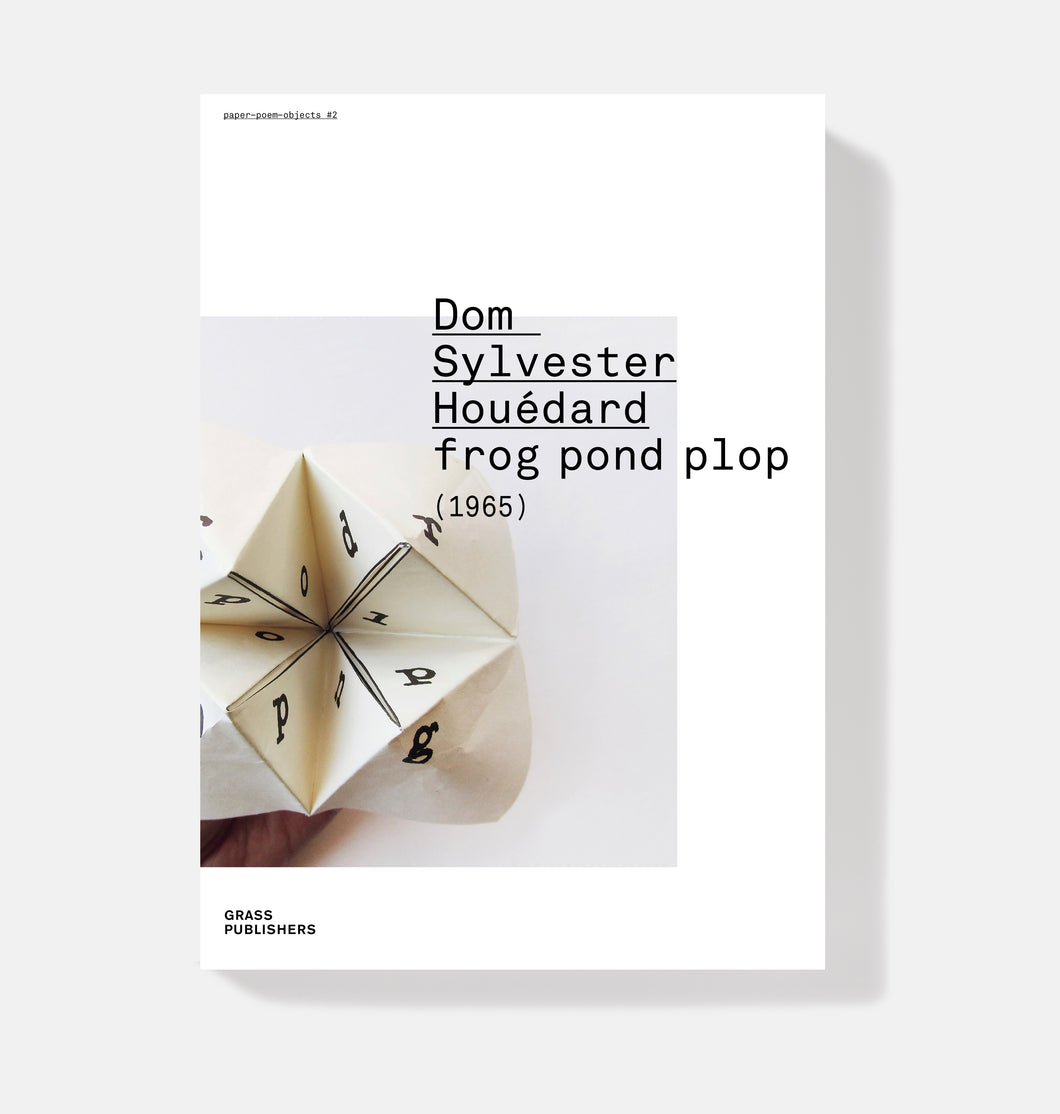
Dom Sylvester Houédard – frog pond plop
normaler Preis
€18.00
angebot
paper–poem–objects #2
Dom Sylvester Houédard – frog pond plop
Poet, Benedictine monk and theologian, Dom Sylvester Houédard (1924–1992) was one of the most dazzling personalities in experimental literature of the post-war avant-garde. Together with John Furnival, he founded in 1963 the press known as “Openings” at Rooksmoor House (Woodchester, Gloucestershire), which published a variety of folded poem objects by now internationally renowned figures, amongst them Ian Hamilton Finlay, Augusto de Campos, Hansjörg Mayer, Tom Phillips and Louis Zukofsky, Edwin Morgan, Richard Kostelanetz and Ernst Jandl. “frog pond plop” (1965) refers to a celebrated Japanese haiku poem by Matsuo Bash¯o from 1686, which takes as its theme the sound of a frog jumping into a pond. Houédard reduces the three groups of words characteristic of the short haiku to three terms that make up the three central motifs of the poem: the frog, the pond and the splashing sound of the disturbed water’s surface. The folded form of this origami poem object, which is also known as a children’s game, allows a playful approach to the text. The design is by Edward Wright, Nazli Zaki, and Matilda Cheung from the School of Graphics at Chelsea School of Art.
Der Dichter, Benediktinermönch und Theologe Dom Sylvester Houédard (1924–1992) war eine der schillerndsten Persönlichkeiten in der experimentellen Literatur der Nachkriegsavantgarde. Mit John Furnival gründete er 1963 die Druckerei „Openings“, die zahlreiche gefaltete Gedichtobjekte heute international renommierter Dichter-Künstler veröffentlichte. Darunter waren Ian Hamilton Finlay, Augusto de Campos, Hansjörg Mayer, Tom Phillips, Louis Zukofsky, Edwin Morgan, Richard Kostelanetz und Ernst Jandl. „frog pond plop“ (1965) bezieht sich auf ein berühmtes Haiku-Gedicht von Matsuo Bash¯o aus dem Jahr 1686, das das Geräusch eines in einen Tümpel springenden Frosches zum Thema hat. Houédard reduziert die für Haikus charakteristischen drei Wortgruppen auf drei Begriffe, die die zentralen Motive des Gedichts ausmachen: den Frosch, den Tümpel und das platschende Geräusch der Wasseroberfläche. Die von einem Kinderspiel bekannte Form dieses Origami-Gedichtobjekts lädt zu einem spielerischen Umgang mit dem Text ein. Für den Entwurf zeichnen Edward Wright, Nazli Zaki, and Matilda Cheung von der School of Graphics am Chelsea School of Art verantwortlich.
Edited and with a text by/Hrsg. und mit einem englischen Text von
Christoph Benjamin Schulz
Edition/Auflage: 150
Grass Publishers, Brauweiler 2022
ISBN 978-3-946848-17-2
Dom Sylvester Houédard – frog pond plop
Poet, Benedictine monk and theologian, Dom Sylvester Houédard (1924–1992) was one of the most dazzling personalities in experimental literature of the post-war avant-garde. Together with John Furnival, he founded in 1963 the press known as “Openings” at Rooksmoor House (Woodchester, Gloucestershire), which published a variety of folded poem objects by now internationally renowned figures, amongst them Ian Hamilton Finlay, Augusto de Campos, Hansjörg Mayer, Tom Phillips and Louis Zukofsky, Edwin Morgan, Richard Kostelanetz and Ernst Jandl. “frog pond plop” (1965) refers to a celebrated Japanese haiku poem by Matsuo Bash¯o from 1686, which takes as its theme the sound of a frog jumping into a pond. Houédard reduces the three groups of words characteristic of the short haiku to three terms that make up the three central motifs of the poem: the frog, the pond and the splashing sound of the disturbed water’s surface. The folded form of this origami poem object, which is also known as a children’s game, allows a playful approach to the text. The design is by Edward Wright, Nazli Zaki, and Matilda Cheung from the School of Graphics at Chelsea School of Art.
Der Dichter, Benediktinermönch und Theologe Dom Sylvester Houédard (1924–1992) war eine der schillerndsten Persönlichkeiten in der experimentellen Literatur der Nachkriegsavantgarde. Mit John Furnival gründete er 1963 die Druckerei „Openings“, die zahlreiche gefaltete Gedichtobjekte heute international renommierter Dichter-Künstler veröffentlichte. Darunter waren Ian Hamilton Finlay, Augusto de Campos, Hansjörg Mayer, Tom Phillips, Louis Zukofsky, Edwin Morgan, Richard Kostelanetz und Ernst Jandl. „frog pond plop“ (1965) bezieht sich auf ein berühmtes Haiku-Gedicht von Matsuo Bash¯o aus dem Jahr 1686, das das Geräusch eines in einen Tümpel springenden Frosches zum Thema hat. Houédard reduziert die für Haikus charakteristischen drei Wortgruppen auf drei Begriffe, die die zentralen Motive des Gedichts ausmachen: den Frosch, den Tümpel und das platschende Geräusch der Wasseroberfläche. Die von einem Kinderspiel bekannte Form dieses Origami-Gedichtobjekts lädt zu einem spielerischen Umgang mit dem Text ein. Für den Entwurf zeichnen Edward Wright, Nazli Zaki, and Matilda Cheung von der School of Graphics am Chelsea School of Art verantwortlich.
Edited and with a text by/Hrsg. und mit einem englischen Text von
Christoph Benjamin Schulz
Edition/Auflage: 150
Grass Publishers, Brauweiler 2022
ISBN 978-3-946848-17-2
